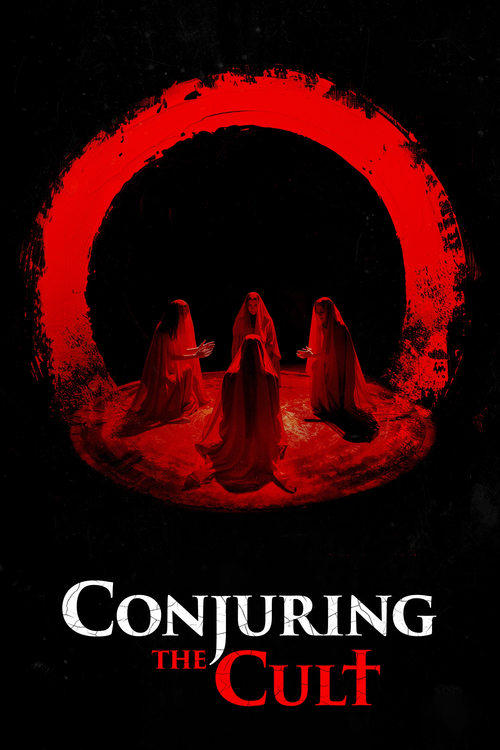Conjuring the Cult

Plot
In the film Conjuring the Cult, David Bryson, a grieving father, is left shattered by the death of his young daughter. The traumatic scene of finding her lifeless body in the bathtub is etched in his mind, haunting him with each passing moment. Desperate for solace, David seeks solace in a self-help group, hoping to find a way to cope with his overwhelming grief. As he attends the meetings, he begins to share his story with the group, and while some offer sympathetic ears, others seem disinterested, dismissing his claims of ghostly encounters as the product of a fragile mind. Feeling isolated and alone, David becomes increasingly withdrawn, often wondering if he's losing his grip on reality. However, during one of the group sessions, a group of mysterious women, dressed in eerie white robes, walk in, radiating an otherworldly aura that unsettles him but also sparks a glimmer of hope. The women, who call themselves 'The Guardians,' claim to possess the ability to communicate with the spirits of the dead, and offer to help David find a way to bring his daughter back to life. Initially, David is skeptical but also desperate, convincing himself that these women might hold the key to saving his daughter's soul. He begins to frequently visit 'The Guardians,' whose leader, the enigmatic and mesmerizing Aurora, takes particular interest in his case. They regale him with tales of their mysterious powers, some of which involve channeling spirits, protecting the vulnerable, and guiding lost souls to the afterlife. Aurora and her cohort form a bond with David, gradually breaking down his defenses, speaking in hushed tones about the power of the universe and their connection to it. Their persuasive arguments and benevolent demeanor persuade David that his deceased daughter is indeed capable of being brought back, underlining the notion that life and death exist on a continuum, intermingled. With each passing day, David becomes increasingly swayed by 'The Guardians' philosophy, envisioning a future where he can reclaim his lost daughter. Despite expressing initial reservations, David eventually agrees to go along with their cryptic plan. In exchange for their assistance, he promises them access to her grave so they can 'complete the resurrection process.' As David and Aurora work on 'resurrecting' his daughter, further unease grips him, whispering secrets he cannot quite articulate into his ears. David starts questioning the fundamental morality of 'The Guardians,' who appear to know more than they let on. Flickers of fear invade his reasoning; is David participating in the wrong fantasy – or worse still, trading his soul? Meanwhile, in a moment of quiet reflection, he comes to realize that the lines between dreams and reality have become blurred. Questions mount in his head as to what is real and what he imagined. Beneath the surface, hidden fears that his mental health was deteriorating with each session start to resurface. When David notices that the pain inside him gradually subsides after each meeting with 'The Guardians,' he makes more inexplicable decisions, plunging further into a dark abyss of psychological decline. Instead of a quest to save his daughter, David fears that 'The Guardians' control has already solidified itself within his fragile consciousness. A twisted psychological experience takes an unforeseen turn when 'The Guardians' become untrustworthy, and David experiences life-changing flashbacks from visions that bring his deceased daughter back alive. In a turn of events, when confronted with choosing between saving his daughter's soul or watching her continue with a tainted past, David reaches a breakthrough point – setting his soul free from the trap spun around him by 'The Guardians.' Ultimately, David's most pivotal choices define not only his fate but that of his daughter's soul as well. In the complex balance of human life and the vast expanse of mortality, only by giving up control to preserve the innocent does the character arrive at contentment, embracing his reality despite heart-wrenching grief.
Reviews
Recommendations

